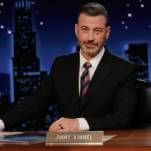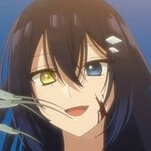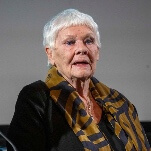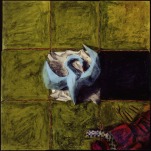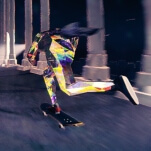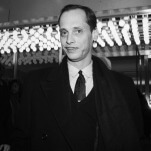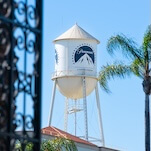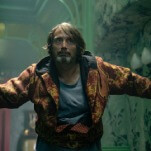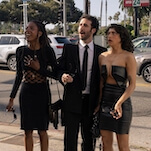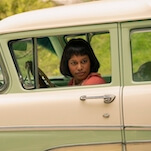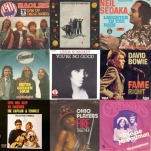AVC: When you say you felt no special relation to music, do you mean your own evolution through music, or the musical world around you?
JO: Yeah, well, the musical world. I felt less and less connection with it, or any reason to be connected with it. The older I got, the less interested I was. I guess I just thought, “When the hell are you going to do the stuff you always said to yourself that you could do?” It was time to put up or shut up to myself. I really hadn’t done anything on my own in eight years, since the last record I had done for Drag City.
I think maybe I just needed to be locked away for a while. I needed to not be connected to anything. But the move here didn’t really have much to do with music at all. For sure, if I just wanted to do my [own music], this would not be the place to come, because it’s very difficult to do what I want to do here, as opposed to the States. Just in terms of the people I’ve used on all my records for the last 12 years. I think that had a lot to do with me playing everything myself on this record.
AVC: When you first started in earnest to work on the new album, what was the idea you set up for yourself? Did you set up challenges, or a certain kind of project?
JO: I did set up rules. A big problem for me with this record is, it’s the first time I’ve recorded something of my own on Pro Tools. Of course I’ve used it before: I had to when I was doing other people’s records, because that’s what they use. But it’s hard for me. That sound is very difficult for me.
AVC: How would you describe that sound?
JO: Bad. Bad sound. It’s culturally representative of bad things to me. Using Pro Tools for acoustic-instrument-based music is very difficult, because the color of the instruments is such an important part of arranging for me. The exact tone color of the instrument, and where it is in the stereo space—that’s all part of the arrangement to me. I’m not saying that’s unique or anything, but it’s vital to me just as much as any other element. And it’s very difficult for me to get that in digital.
AVC: From a producer’s standpoint, what is the main problem with digital sound software like Pro Tools?
JO: If you just listen to a record on CD or something once, it’s not a problem. But when you’re working on one minute of a song for 12 or 14 hours, it’s very wearying. It just kills your ears. And you really don’t remember, most of the time, that it’s this digital distortion that is slowly wearing your ears down. You forget, and you get this kind of mental attitude of like, “Jesus Christ, this completely sucks!” You know? You forget that your ears are tired because you’ve been listening to this tin can for the last 12 hours.
AVC: Was that really a new phenomenon for you in the studio?
JO: Well, with my own stuff. When I’m doing other people’s records that I have to do on Pro Tools, I always very consciously say, “Remember, it’s your job to be a sounding board. It’s your job to do this, this, and this, but at the end of the day, it’s not your thing.” You have to have a certain reserve as to how much of your aesthetic you put into it. For my own stuff, I have to decide everything. That was the initial problem: How am I going to be able to do this? And then I made a rule that everything had to be right in one take [as opposed to editing together parts of different takes]. I think that added a year to the record. But I just decided these things were necessary.
AVC: Why?
JO: It was one way of trying to avoid falling into the pit of recording digitally, where you have a million options and you very quickly lose the forest for the trees. You can get very excited about these options, but the options have nothing to do with what you’re actually doing. So I decided to limit myself. It was another way I wouldn’t be treating it any differently than a tape recorder. And another reason was like, “Gee, if you can’t do a good take, should you really be doing this?” It wasn’t like I was like those religious—what’s the name: extreme Catholics?—where I had to atone at the end of the day for playing an F instead of an F-sharp. [Laughs.] But I was fairly strict with myself.
AVC: How did you come to reconcile the sound that Pro Tools churns out?
JO: I spent a year mixing. I just found my way. In the end I don’t know whether it sounds good. I played it for someone, a particular artist who is fairly well known for not touching digital with a 10-foot stick. They heard the record and I asked them, “Is it digital or analog?” They said, “I don’t think it’s digital.” That made me happy. It’s not the whole silly digital/analog debate—to me, it’s the difference between a representation of a sound, and a sound that defines itself. I have problems with things that are basically just ciphers representing sounds. It’s something I’m really concerned about, the lack of air. It’s the lack of the electrons going into a space where the electrons actually interact, as opposed to information being summed and added. There’s a tangible difference between the two.
AVC: How did you start on the composition of it? It moves very well, and sounds very through-composed. Did you chart it out?
JO: Not so much “chart it out.” My general way of working is usually to set up a problem for myself, and then the question for me is “How do I solve this problem?” Whether that be musically, or getting from this to that, or just “What the hell is the point of this?” I set up these roadblocks for myself. “Okay, I want it to move from this to this, but how the hell am I going to do that?” It’s not too much like exquisite corpses, but I guess it has an element of that. It’s a way of tripping myself up so I go in a direction that isn’t necessarily what I would do naturally. It’s more interesting for me to purposely make a situation difficult, because I want to be forced to look at something with a different perspective.
AVC: What’s an example of how you set up problems?
JO: Say for instance I have something going on where there’s a piano and a guitar and a bass and no drums. The challenge there might be, “Is there a way I can write a drum part that would change the rhythmic aspect of everything above it, as opposed to being something that works rhythmically with it?” And then once you have that, how can you make that work while still seeming to be something else? It’s very easy to do something musically that foregrounds the idea that something is going on. To me, the more interesting idea is “How can you do that while making it appear that nothing is going on, that doesn’t draw attention?”
AVC: Is there a particular passage or moment on the record that illustrates that for you?
JO: At the beginning of the record, where everything just stops. But it’s also extra-musical elements, because whether I like it or not, there’s a certain sort of narrative going on with anything I do in relation to the things I did before. That seems to be a foregrounded idea for a lot of people. So that’s another thing I can play with. There are a lot of elements of that, where it’s like “I’m going in this direction, and this is where I would go, so how can I not go there?”
AVC: The beginning, where the record just stops, is interesting. It’s almost like the record itself doesn’t know what kind of record it’s going to be. It sounds uncertain about where it might stand to go.
JO: It definitely does that. But the thing for me is, “How can you modulate those things. How can I make this work? How can I make it do what I want it to do and still work as music?” It’s kind of like a sleight-of-hand thing, almost.
AVC: Thinking about music as a set of problems and solutions is a big part of what you do. And this time, you took to playing everything yourself and putting it together in pieces. Do you think of yourself as a formalist?
JO: Formalist? Maybe cranky old man. [Laughs.] It’s not so much that I think formally about it. It’s like what I was saying earlier: I’m almost pathologically trying to trip myself up, because I don’t want to see things the way I’ve seen them before. Usually the result—what people hear—is partially where I’ve gotten to when I surprised myself. It’s a natural part of how I work. If anything, I approach things probably like a critic.
AVC: How so?
JO: There is a real critical element to it all, because I’m defining what I believe in regard to whatever my questions are. This time, it was like, “Where the hell do I stand now? Do I have anything to do with this world? Do I even need to?” It’s a dumb example to use, but I’ve always admired certain filmmakers who make genre films, but manage to do other stuff while still making a genre film. The hard part is how to still make what you’re supposedly making. It’s very easy to put the sheen of something else on top of something. Obviously, interesting things can be done that way. But to me, the most interesting challenge is how can you still retain? Like, Richard Fleischer is a perfect example of someone I really, really admire. Or Robert Aldrich. The way that they work is, to me, really interesting and encouraging and fascinating—the way you find the bridge between criticism and what you’re supposedly doing. I’ve been influenced by things like that ever since I was a little kid.
AVC: Your last couple of solo records trafficked in really rich black-comic songwriting. Why did you choose to not sing and write words for this record?
JO: I just didn’t want to write lyrics anymore. I think I did what I wanted to do with lyrics on the last record. Not so much Eureka, the one record I can’t fucking stand. It’s just a disaster to me. But the last record [Insignificance], I think I got pretty close. It generally was not liked, though, so I definitely didn’t get much encouragement to do more.
AVC: What did you want to do? What was the project you feel you ultimately worked through?
JO: The basic idea I had with that record is… An old example I was always fascinated with as a kid was when Alfred Hitchcock made Stage Fright. It was the only film where he lied. He followed the narrative of one particular character, but it’s a lie. A character tells a lie in the film, and it’s dramatically presented that way. He’s the narrator, the driving force of the film. But he’s a liar. Therefore, of course, what we’re watching is “not true.”
AVC: That’s revealed later on in the film?
JO: Yeah. But in the books I read, this was scandalous, and Hitchcock said, “This is the only mistake I ever made in my filmmaking career.” That combined for me with this idea that whenever people hear a song and they’re upset about the lyrics, they would be upset as if the person singing to them is actually the singer. I was fascinated with this disconnect—the idea that the person whose picture is on the record is somehow representing themselves fully, as opposed to playing a character or working with things like that. I got really interested in this idea of the unreliable narrator.
AVC: Why do you hate Eureka so much at this point?
JO: Well, it’s not like I like anything I’ve done. But I just don’t like how [Eureka] sounds. I know I had nothing to work with at the time, but it just sounds cheap to me. And I don’t think I was there yet with lyrics. I think they’re kind of clumsy. I know the record meant something to a lot of people, which is nice. But I rarely like anything of my own. I don’t think the reason to make records for myself is to like them. But I can’t comprehend why people like that one. I can, but I can’t. It makes me question what people are hearing. If they’re hearing things in a way that isn’t necessarily what I was trying to do, then I failed. In a way, that record represents a real failure for me.
AVC: Does part of that not thrill you—the prospect of music having been made, and then going on to do whatever it does on its own?
JO: I’m not a big fan of that. I’m not one of those hippies, like, “Man, I set it free.” If you want to set it free, go into the forest. Throw the cape down on the ground and leave. I know you can’t communicate what you’re saying with music. You can’t. You can modulate something so it leans in a direction of what you’re saying. But you can’t communicate it [fully] unless you’re basically just lecturing people.
AVC: Having made music as long as you have, and in as self-critical a manner as you have, how has your relationship to listening to records changed?
JO: Well, it hasn’t changed. It’s been like that since I was young. If anything, it’s the reverse.
AVC: Do you listen to other people’s records to try to figure out how they work?
JO: I’m not trying to figure out how they work. I guess the thing that’s interesting to me is, I want to see how they get through the problems inherent in it all. How are you going to get out of this trap? What I’m listening for is how they solve that. Sort of just like handing out a word problem to a class and hopefully somebody comes back with a creative answer that goes in a direction that’s outside your experience. That’s just part of my nature. Whenever I listen to anything, that’s sort of that whole sub-programming that’s going on. I’ve thought that way as far back as I can remember.
AVC: What is the primary “problem” in music-making? Is it that so often there are conventional patterns that play out without people being aware of that they’re following them?
JO: That’s a symptom of the problem, to me. For me, the main problem in music-making is “How can I find a way to step outside my own experience so I can find a different way to stand, and then see everything in a different light?” That to me is the main thing. What you were saying—those are sort of like symptoms of not doing that, of not forcing yourself to look at something from a different perspective. It may be a waste of time. There may be nothing interesting about it at all. But that question of how can you step outside your own experience to see this from a different light—that’s in the music I like the most. It’s not so much like, “Oh, I’ve never heard anything like that before.” It’s like, “I’ve never heard anything like that before.” You know what I mean? [Laughs.] “That completely changed where I’m sitting in relation to music, and to what this music represents.” It sounds silly, but I really love later Led Zeppelin. That stuff really surprised me when I heard it as a kid. I’m just thinking of something that works for everyone on a grand scale. It took a left turn, I guess you could say.
AVC: Does that apply to art in general to you? Or do you think it’s uniquely situated within music?
JO: It applies to almost anything in my life. I look at almost anything that way. But I guess in music, because it’s the thing I do, for better or for worse, I’m even a little stricter.
AVC: There are 200 tracks on parts of the new album. How did you get up that high? Was layering a goal?
JO: Well, it wasn’t like I was going for 200 tracks. There are just points where the arrangement has a string section and a horn section, as well as two drum sets… Because I have to play everything myself instead of recording a couple string players, I had to record each individual part. A couple parts, just recording the string section alone was like 30 tracks, because I had to play it 30 times. And then the horn section, I had to record another 20 tracks, because I had to play all the parts myself. It was more just practical that it got that big. If anything, when it came time to mix, I looked and went, “Jesus Christ!” It wasn’t an aesthetic decision to get that big. I mean, there were a couple trombone parts in there, and I can’t play trombone. For like half a year, I was looking for some other instrument color that would work. And finally I was just like, “It’s got to be trombone.” So I bought a trombone, and I practiced for a couple months, and I got to the point where I could play the parts correctly. I think it was only like 10 seconds of trombone on there, but I spent six months on that 10 seconds. [Laughs.]
AVC: It’s hard to imagine a prospect more horrible than listening to somebody learning to play trombone.
JO: I didn’t enjoy it. [Laughs.]
AVC: What’s your default instrument? What are you best at?
JO: I’m much better on bass than on guitar, actually. I think the only instrument I enjoy in a traditional sense is probably pedal steel. But I’m definitely not skillful on that. I want to be, but I’m not good with my legs. I don’t have good coordination with my legs. I guess in a traditional sense, the instrument I like best? I don’t really like the guitar. I really don’t like that thing.
AVC: What other ways are there of enjoying an instrument than the traditional ways?
JO: Um, none. [Laughs.] I mean traditional instruments that I enjoy. Some people use things like Buchla synthesizers, these old synthesizers—not the Moog kind of synthesizers, but the mad-scientist, patchboard kind. There’s this whole West Coast/East Coast synth history where Moogs and things like that are related to the idea of creating a voice that’s instrumental, where things like the Bukla and the Serge are kind of like science-fiction: machines that happen to make sound, but not oriented toward interacting with instruments in the sense of how you think of it. I like those. Those are my favorite. The Serge synthesizer is my favorite instrument in the world, but it’s not really an instrument in that way. That’s the only thing I could sit down for hours and work on and just enjoy.
AVC: Would you say that by the time you got to recording for The Visitor, you had all the parts worked out?
JO: Oh God, yes. I mean, a lot of it is trial and error. Sometimes I would be trying to do something, and I would step away for a while. It could be something silly, like going in the other room and not being able to hear the kick drum anymore, but then I hear the snare. And all of the sudden, “Ah, yes, if I look at it that way—right!” And not having that dynamic with another musician where I’m worried about upsetting him, or making him play something difficult, or worried whether he’s tired. It’s not right, but I don’t want to hassle him, because I’ve already hassled him enough. There was none of that. I can be as hard on myself as I want. Who am I going to get mad at? Me.

